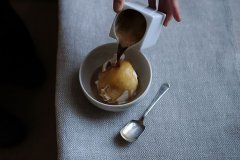Single bean flavor characteristics, producing areas and cooking parameters of Snow vein Manor in Bolivia
For professional baristas, please follow the coffee workshop (Wechat official account cafe_style)
Single bean flavor characteristics, producing areas and cooking parameters of Snow vein Manor in Bolivia
Takesi Manor, the treatment of drinking water and coffee after harvest, uses ice-cold mountains and rivers that melt high mountains, so we give her a nickname: Takesi Snow vein Manor. In addition to a low-temperature, pollution-free environment, fertile and well-drained volcanic soil is also an essential element of coffee flavor. Although the owner of Agrotakesi SA is rich, he deeply respects nature and the way of getting along with each other, does not over-cultivate, and retains a large number of primitive forests and diverse ecological environment. It is famous for its crops such as apples, orchids and flowers, and now it has won the championship of the coffee contest, and Takesi's reputation has become even more popular.
I remember that the admirable champion bean in 2007 was Coffee Manor, but her score was overtaken by the 2008 champion Cafe de Cordillera, when the international judges gave it a high score of 92.03. in 2009, Takesi Snow vein Manor got a score of 93.36, surpassing the champion of 2008, and the bidding price was as high as US $35.05. it was the highest bid in CoE national competition in 2009! Osher has been bidding for Bolivia's champion beans for three years in a row. She is really attracted by her delicate floral fragrance, charming sweet vanilla and clean and changeable flavor. In 2010, many factors, Bolivia decided to cancel the national competition, examine this batch of Takesi winning beans, it is mixed feelings, hard-won ah.
Bolivia's high-quality estates, very high altitude, perennial low temperature environment, so that coffee fruit growth is slow, tight enough, aroma is also charming, floral aroma is obvious, such as careful handling, cherries with the same maturity, often have a clean and meticulous high-end taste, this elegant vanilla and honey aromas are very attractive, this champion bean has a variety of floral aromas, vanilla and sweet very long-lasting.
The goal of planting coffee in the whole Takesi manor is 200ha, but only 13ha is planted and harvested very little Typica species, and the annual yield is only 120bags. This is not only fine agriculture, but also a farming mode that respects nature. Takesi is the name of the local aborigines, the place name and the snow water from the mountains, also known as Takesi. After the publication of the CoE final in 2009, Takesi is no longer unknown, proud and exuberant!
The following is the basic information and cup taste of this batch of champion beans:
The following information is from the European Cup test report and the official website of CoE:
Country: Bolivia, Bolivia
Production area: Yungas of La Paz
Administrative town: Yanacahi
Award-winning Manor: Agrotakesi SA
Landowner: Mauricio Ramiro Diez de Medina
Ranking: No.1 (2009 CoE champion)
Farm area: 2500 hectares
Coffee garden: 200 ha
Altitude: 2100 m
Certification:. (Ceser & USDA ORGANIC Certification)
Variety: Typica
Treatment: Wet process and Mechanized Drying
Champion batch: 24 cases, 825 kg
International evaluation score: 93.36
Cup test code #: CAR-003
Tender price: 35.05 USD
Winning bidder: Maruyama Coffee for Mikatajuku Group, Itoya Coffee and Orsir Coffee (Osher)
Test report of the Osher Cup (start the pot in the middle of an explosion, bake for 12 minutes)
Dry fragrance: a variety of flowers, sweet vanilla, full aroma, sweet spices, honey
Wet fragrance: flower fragrance, refreshing perfume, sweet chocolate, berries
Sipping: many kinds of floral aromas, excellent cleanliness and fineness, fine vanilla sweet, delicate sugar, peaches, apricots, sour and sweet, premium Burgundy red wines, vanilla plants, green apples, white grapefruit, essential oil aromas, delicate and smooth touch, sweet finish and long-lasting aromas.
BOLIVIA Bolivia
Population: 10461000
Coffee-growing areas in Bolivia have never been significantly drawn, which is why different bakers use different naming conventions to describe different sources of coffee beans.
YUNGAS
About 95% of Bolivian coffee is produced in this region, and it has enjoyed a high reputation in Europe in the past and recently. This area is a forest that stretches to the east of the Andes, and in fact, through Bolivia, from Peru to Argentina, some coffee is produced, which is the highest in the world and the longest grown in Bolivia. Ukers's 1935 book AllAbout Coffee mentions that most coffee buyers in this area, west of La Paz, must follow the Yongga Road, nicknamed "the Road of death," to reach coffee producers. The road is a single-lane, winding mountain road with a valley depth of 600 metres and there is no barrier to prevent vehicles from falling. And because the area is so large, many coffee roasters describe the coffee in the area, using a more specific area, such as Caranavi,Inquisivi or Coroico.
Altitude: 800-2300 m (2600-7600 ft)
Harvest: July to November
SANTA CRUZ
Located in the easternmost part of Bolivia, there is a general lack of high-quality coffee at altitude. Some coffee is produced around lchilo province, although coffee is far less important than other staple crops such as ─ rice or wood. Because most of the natural gas is discovered in this area, the area is very important to the country's economy.
Altitude: 410m
Harvest: July to November
Takesi Snow vein Manor
The average temperature here is only 15 degrees C, the water source comes from alpine melting snow water, there is no pollution, and there is rich volcanic soil, and the elevation is more than 2000 meters. The coffee planted is full of various aromas and full sweetness. She is the 2009 Bolivian champion Takesi Snow vein Manor. If possible, I would even like to visit again immediately.
Takesi Manor in the Mururata mountains of Sud Yungas, about 100km from the capital La Paz, can only be reached by the Inca ancient road. Here, it is still a branch of the Andes, and the manor belongs to the Agrotakesi SA institution. The whole farm has about 2500 hectares, about 1900 to 3000 meters above sea level. Takesi, where coffee is grown, is 2100 meters above sea level. This should be one of the rare high-altitude estates. As far as the coffee farms I have been to, only Ethiopia. Comparable to the Hama Cooperative in Yegashev, the aroma of the two is equally remarkable, but the difference is that Takesi has a continuous Bolivian champion flavor, with a variety of flowers and sweet vanilla, which is particularly outstanding and unforgettable.
Important Notice :
前街咖啡 FrontStreet Coffee has moved to new addredd:
FrontStreet Coffee Address: 315,Donghua East Road,GuangZhou
Tel:020 38364473
- Prev

Differences, distinctions and awards of single beans in Snow vein Manor, Bolivia
Professional barista exchanges please pay attention to the coffee workshop (Wechat official account cafe_style) Bolivia snow vein manor single bean differences, distinction and award situation of high-quality estates in Bolivia, the altitude is very high, years of low temperature environment, so that coffee fruit growth is slow, tight enough, aroma is also charming, floral aroma is obvious, such as careful handling, picking cherries with the same maturity
- Next

Single bean grading, price, raw bean and baking curve of Snow vein Manor in Bolivia
Professional barista exchanges please follow the coffee workshop (Wechat official account cafe_style) Bolivia snow vein manor single bean classification, price, raw beans and baking curve Takesi snow vein manor here the average temperature is only 15 degrees C, the water source comes from alpine melting snow water, no pollution, and there is fertile volcanic soil, more than 2000 meters above sea level, the coffee grown is full of various aromas.
Related
- Does Rose Summer choose Blue, Green or Red? Detailed explanation of Rose Summer Coffee plots and Classification in Panamanian Jade Manor
- What is the difference between the origin, producing area, processing plant, cooperative and manor of coffee beans?
- How fine does the espresso powder fit? how to grind the espresso?
- Sca coffee roasting degree color card coffee roasting degree 8 roasting color values what do you mean?
- The practice of lattes: how to make lattes at home
- Introduction to Indonesian Fine Coffee beans-- Java Coffee producing area of Indonesian Arabica Coffee
- How much will the flavor of light and medium roasted rose summer be expressed? What baking level is rose summer suitable for?
- Introduction to the characteristics of washing, sun-drying or wet-planing coffee commonly used in Mantenin, Indonesia
- Price characteristics of Arabica Coffee Bean Starbucks introduction to Manning Coffee Bean Taste producing area Variety Manor
- What is the authentic Yega flavor? What are the flavor characteristics of the really excellent Yejasuffi coffee beans?

